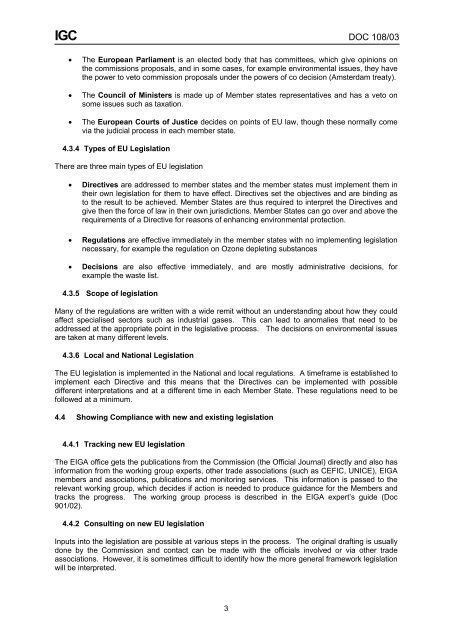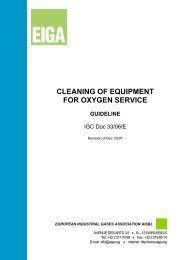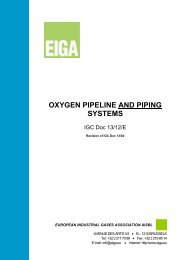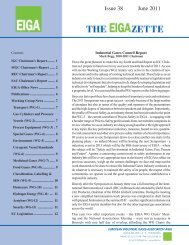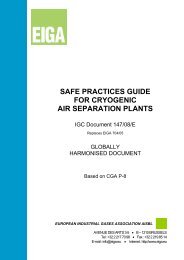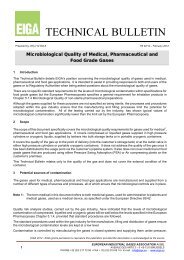environmental legislation applicable to industrial gases ... - eiga
environmental legislation applicable to industrial gases ... - eiga
environmental legislation applicable to industrial gases ... - eiga
Create successful ePaper yourself
Turn your PDF publications into a flip-book with our unique Google optimized e-Paper software.
IGC DOC 108/03<br />
• The European Parliament is an elected body that has committees, which give opinions on<br />
the commissions proposals, and in some cases, for example <strong>environmental</strong> issues, they have<br />
the power <strong>to</strong> ve<strong>to</strong> commission proposals under the powers of co decision (Amsterdam treaty).<br />
• The Council of Ministers is made up of Member states representatives and has a ve<strong>to</strong> on<br />
some issues such as taxation.<br />
• The European Courts of Justice decides on points of EU law, though these normally come<br />
via the judicial process in each member state.<br />
4.3.4 Types of EU Legislation<br />
There are three main types of EU <strong>legislation</strong><br />
• Directives are addressed <strong>to</strong> member states and the member states must implement them in<br />
their own <strong>legislation</strong> for them <strong>to</strong> have effect. Directives set the objectives and are binding as<br />
<strong>to</strong> the result <strong>to</strong> be achieved. Member States are thus required <strong>to</strong> interpret the Directives and<br />
give then the force of law in their own jurisdictions. Member States can go over and above the<br />
requirements of a Directive for reasons of enhancing <strong>environmental</strong> protection.<br />
• Regulations are effective immediately in the member states with no implementing <strong>legislation</strong><br />
necessary, for example the regulation on Ozone depleting substances<br />
• Decisions are also effective immediately, and are mostly administrative decisions, for<br />
example the waste list.<br />
4.3.5 Scope of <strong>legislation</strong><br />
Many of the regulations are written with a wide remit without an understanding about how they could<br />
affect specialised sec<strong>to</strong>rs such as <strong>industrial</strong> <strong>gases</strong>. This can lead <strong>to</strong> anomalies that need <strong>to</strong> be<br />
addressed at the appropriate point in the legislative process. The decisions on <strong>environmental</strong> issues<br />
are taken at many different levels.<br />
4.3.6 Local and National Legislation<br />
The EU <strong>legislation</strong> is implemented in the National and local regulations. A timeframe is established <strong>to</strong><br />
implement each Directive and this means that the Directives can be implemented with possible<br />
different interpretations and at a different time in each Member State. These regulations need <strong>to</strong> be<br />
followed at a minimum.<br />
4.4 Showing Compliance with new and existing <strong>legislation</strong><br />
4.4.1 Tracking new EU <strong>legislation</strong><br />
The EIGA office gets the publications from the Commission (the Official Journal) directly and also has<br />
information from the working group experts, other trade associations (such as CEFIC, UNICE), EIGA<br />
members and associations, publications and moni<strong>to</strong>ring services. This information is passed <strong>to</strong> the<br />
relevant working group, which decides if action is needed <strong>to</strong> produce guidance for the Members and<br />
tracks the progress. The working group process is described in the EIGA expert’s guide (Doc<br />
901/02).<br />
4.4.2 Consulting on new EU <strong>legislation</strong><br />
Inputs in<strong>to</strong> the <strong>legislation</strong> are possible at various steps in the process. The original drafting is usually<br />
done by the Commission and contact can be made with the officials involved or via other trade<br />
associations. However, it is sometimes difficult <strong>to</strong> identify how the more general framework <strong>legislation</strong><br />
will be interpreted.<br />
3


